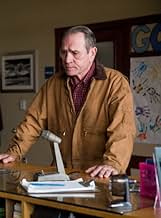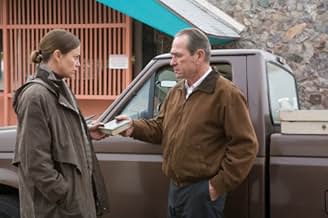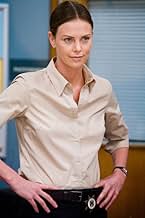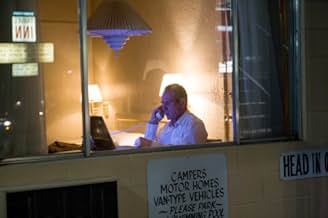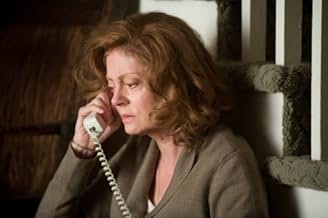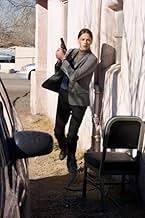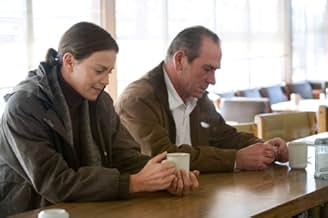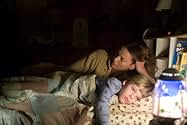VALUTAZIONE IMDb
7,1/10
76.511
LA TUA VALUTAZIONE
Un veterano ed ex membro della polizia militare lavora con un detective per scoprire la verità sulla scomparsa del figlio, che era tornato a casa in licenza per una settimana dall'Iraq.Un veterano ed ex membro della polizia militare lavora con un detective per scoprire la verità sulla scomparsa del figlio, che era tornato a casa in licenza per una settimana dall'Iraq.Un veterano ed ex membro della polizia militare lavora con un detective per scoprire la verità sulla scomparsa del figlio, che era tornato a casa in licenza per una settimana dall'Iraq.
- Candidato a 1 Oscar
- 3 vittorie e 21 candidature totali
Roman Arabia
- Private Robert Ortiez
- (as Victor Wolf)
Greg Serano
- Detective Manny Nunez
- (as Greg Serrano)
Recensioni in evidenza
I just saw this film and consider it to be one of the best anti-war films I've seen in quite a long time. And that makes me wonder at what the various critics are thinking. Roger Ebert gets it right, but some film critics are far too dismissive of a very serious, important film. James Berardinelli, in particular, seems curiously _angry_ that this film depicts the moral degradation of war in a frank and honest fashion.
Berardinelli is basically wrong in every single thing he says about the film. Since this film is not a "politcal message" film, it has no requirement to "show both sides equally". It is a story about a group of soldiers basically driven beyond the area of traditionally human behavior. Berardinelli thinks that it's "obvious" that war changes the way people feel about their country.
I sense a person utterly detached from history when I read that. A recent study concluded that the English were, as a group, fairly happy during WWII, even when their nation was under attack. Why was that? Because they believed in what they were doing. The notion that war _necessarily_ results in moral breakdown is, while hardly novel, also not true. That is part of what is important about "Elah". Jones' character is a veteran of the Vietnam war, and is hardly a delicate flower when it comes to the matters of war and its effect on the psyche. And yet even he is floored at what the Iraq war has done to the soldiers.
It is easy for a film critic to simply reject what is essentially reporting on the state of the military today. That Berardinelli does so with such vitriol makes me guess that he is injecting his own bias into the review.
Berardinelli is basically wrong in every single thing he says about the film. Since this film is not a "politcal message" film, it has no requirement to "show both sides equally". It is a story about a group of soldiers basically driven beyond the area of traditionally human behavior. Berardinelli thinks that it's "obvious" that war changes the way people feel about their country.
I sense a person utterly detached from history when I read that. A recent study concluded that the English were, as a group, fairly happy during WWII, even when their nation was under attack. Why was that? Because they believed in what they were doing. The notion that war _necessarily_ results in moral breakdown is, while hardly novel, also not true. That is part of what is important about "Elah". Jones' character is a veteran of the Vietnam war, and is hardly a delicate flower when it comes to the matters of war and its effect on the psyche. And yet even he is floored at what the Iraq war has done to the soldiers.
It is easy for a film critic to simply reject what is essentially reporting on the state of the military today. That Berardinelli does so with such vitriol makes me guess that he is injecting his own bias into the review.
Released in 2007 and directed & written by Paul Haggis, "In the Valley of Elah" is a crime drama/mystery inspired by the real-life case of Richard T. Davis. The story revolves around an elderly Tennessee couple (Tommy Lee Jones & Susan Sarandon) who get word that their son has gone missing from his base in New Mexico shortly after his return from Iraq. A retired military investigator, Hank Deerfield (Jones) goes to the base to find out the awful truth. Charlize Theron plays the civilian detective near the base who tries to help Hank while Jason Patric plays the Army counterpart. Josh Brolin is on hand as the town police chief.
This is a slow-burn mystery highlighted by great acting by the principles, especially Jones, and a thoroughly realistic story, which isn't surprising seeing as how it's based on true events. Speaking of which, I was surprised to find out that the basic details of the story are all accurate. The actual events took place in the Fort Benning area of Georgia rather than the fictitious Fort Rudd, NM.
The movie's not anti-Iraq War, but rather anti-PTSD; it merely reveals the awful truth about war in general: When we send our young men off to far-off lands where brutal warfare is normal they can bring that desensitized mentality back with them where the barbaric behavior that might be acceptable in war is anything but normal or conducive to a successful life, to say the least. Add the idiocy of alcohol abuse to the mix of PTSD and the results almost certainly WON'T be good.
The title refers to the valley where David, as a teen, fought and defeated the utterly intimidating Goliath from 1 Samuel 17.
ADDITIONAL ACTORS: James Franco, Wes Chatham, Jake McLaughlin, Mehcad Brooks and Roman Arabia play soldiers who knew Deerfield's son while Frances Fisher has a curious cameo (you'll know what I mean).
The film runs 121 minutes and was shot in Whiteville, Tennessee, and Albuquerque, New Mexico, with Morocco substituting for Iraq.
GRADE: B
This is a slow-burn mystery highlighted by great acting by the principles, especially Jones, and a thoroughly realistic story, which isn't surprising seeing as how it's based on true events. Speaking of which, I was surprised to find out that the basic details of the story are all accurate. The actual events took place in the Fort Benning area of Georgia rather than the fictitious Fort Rudd, NM.
The movie's not anti-Iraq War, but rather anti-PTSD; it merely reveals the awful truth about war in general: When we send our young men off to far-off lands where brutal warfare is normal they can bring that desensitized mentality back with them where the barbaric behavior that might be acceptable in war is anything but normal or conducive to a successful life, to say the least. Add the idiocy of alcohol abuse to the mix of PTSD and the results almost certainly WON'T be good.
The title refers to the valley where David, as a teen, fought and defeated the utterly intimidating Goliath from 1 Samuel 17.
ADDITIONAL ACTORS: James Franco, Wes Chatham, Jake McLaughlin, Mehcad Brooks and Roman Arabia play soldiers who knew Deerfield's son while Frances Fisher has a curious cameo (you'll know what I mean).
The film runs 121 minutes and was shot in Whiteville, Tennessee, and Albuquerque, New Mexico, with Morocco substituting for Iraq.
GRADE: B
There are many people out there who hate the way Paul Haggis made his directorial debut, "Crash," an overly soapy and stupidly-tied-together drama (at least, that's what it felt like to them). Those people don't have to worry. His second major directorial outing, "In the Valley of Elah," avoids both of the "mistakes" (although I'd hardly call them that, seeing as he won Best Picture for what he did with "Crash") that he made last time around. Instead of mixing together multiple stories and having them all connect at the very end, this movie revolves around one main story, a story that seems a lot like the modern-day war version of "Chinatown." Instead of going for simple emotional tugs that he did with "Crash," this film focuses on its understated performances, namely from Tommy Lee Jones, who is superb in this film. It is truly courageous of Paul Haggis to be willing to make some serious changes to the style that won him a Best Picture Academy Award, and even more impressive that he pulls it off very well.
The story revolves around an ex-military officer, Hank Deerfield, who is told that his son, a soldier returning home from Iraq, has gone missing. Jones plays the character in such a quiet way that makes you feel like he thinks he shouldn't be showing emotion, but has a lot of it bottled up inside of him. When he arrives at the military station, people don't seem to want to tell him what happened, and say that they expect he'll come to the base anytime soon (this is portrayed especially well by James Franco, who you may know as Harry Osbourne from the "Spider-man" movies).
Refusing to believe that it's as simple as that, Deerfield is relentless in getting information out of people as to what really happened. It's the way he functioned in the army, and it benefits him greatly as he has to get any information he can out of people. Enter Detective Emily Sanders (played by a very strong Charlize Theron), who at first just wants to get through her job for the day, but soon gets wrapped up in also discovering what really happened to Deerfield's son. The two of them have great chemistry together, as their two different personalities give two different perspectives on what's happening.
The movie works because although it does have quite a few negative things to say about the current war in Iraq, the entire film isn't a two-hour tirade against it. It only makes that message part of the story, and does it in subtle ways (aka the soldiers don't just go "War...it...destroys...you..." but take a lot more time expressing their emotion). Much of the story works like a mixture between the great film "Chinatown" and a much better-acted, better-written version of a really good episode of "CSI." Although there may be a few too many twists and lies circling about, it comes to its conclusion very well in a satisfying way for the audience.
Paul Haggis has an uncanny way of bringing out great performances from all of his actors. The performance of Tommy Lee Jones could be the best of his career, he brings out a much more emotionally quiet side in Charlize Theron than we've before seen, the short performance of Susan Sarandon is particularly powerful, and all of the soldiers are played with a feeling of sincerity. The acting is probably the strongest element of the film, and if there's any "weak part," it would have to be the way Haggis forced out some of the plot twists to make the film as long as he wanted it to be.
Regardless of its few problems, "In the Valley of Elah" is both a very well-mannered look at the war in Iraq and its effects on the people involved, as well as a very interesting crime thriller. At the heart of it is Haggis's quietly powerful directing style and the cast's powerfully quiet performances. I don't see this picking up a Best Picture nomination as Haggis's past three Oscar hopeful screenplays ("Letters from Iwo Jima," "Crash," and "Million Dollar Baby"), but I would not be surprised to see it pick up a few acting nominations as well as possibly a screenplay nod. If it does...it would have definitely earned it.
The story revolves around an ex-military officer, Hank Deerfield, who is told that his son, a soldier returning home from Iraq, has gone missing. Jones plays the character in such a quiet way that makes you feel like he thinks he shouldn't be showing emotion, but has a lot of it bottled up inside of him. When he arrives at the military station, people don't seem to want to tell him what happened, and say that they expect he'll come to the base anytime soon (this is portrayed especially well by James Franco, who you may know as Harry Osbourne from the "Spider-man" movies).
Refusing to believe that it's as simple as that, Deerfield is relentless in getting information out of people as to what really happened. It's the way he functioned in the army, and it benefits him greatly as he has to get any information he can out of people. Enter Detective Emily Sanders (played by a very strong Charlize Theron), who at first just wants to get through her job for the day, but soon gets wrapped up in also discovering what really happened to Deerfield's son. The two of them have great chemistry together, as their two different personalities give two different perspectives on what's happening.
The movie works because although it does have quite a few negative things to say about the current war in Iraq, the entire film isn't a two-hour tirade against it. It only makes that message part of the story, and does it in subtle ways (aka the soldiers don't just go "War...it...destroys...you..." but take a lot more time expressing their emotion). Much of the story works like a mixture between the great film "Chinatown" and a much better-acted, better-written version of a really good episode of "CSI." Although there may be a few too many twists and lies circling about, it comes to its conclusion very well in a satisfying way for the audience.
Paul Haggis has an uncanny way of bringing out great performances from all of his actors. The performance of Tommy Lee Jones could be the best of his career, he brings out a much more emotionally quiet side in Charlize Theron than we've before seen, the short performance of Susan Sarandon is particularly powerful, and all of the soldiers are played with a feeling of sincerity. The acting is probably the strongest element of the film, and if there's any "weak part," it would have to be the way Haggis forced out some of the plot twists to make the film as long as he wanted it to be.
Regardless of its few problems, "In the Valley of Elah" is both a very well-mannered look at the war in Iraq and its effects on the people involved, as well as a very interesting crime thriller. At the heart of it is Haggis's quietly powerful directing style and the cast's powerfully quiet performances. I don't see this picking up a Best Picture nomination as Haggis's past three Oscar hopeful screenplays ("Letters from Iwo Jima," "Crash," and "Million Dollar Baby"), but I would not be surprised to see it pick up a few acting nominations as well as possibly a screenplay nod. If it does...it would have definitely earned it.
A gung-ho ex military man gets word that his son, a soldier in Iraq, has gone AWOL. The film's plot follows the father, played by Tommy Lee Jones, as he sets about trying to find out what happened. Most of the characters here are either military people or local cops.
The story is heavy on mystery and investigation. The father's research skills are more potent than those of some local cops. Subtle plot twists and red herrings throughout keep the story's outcome uncertain until the end.
Based very loosely on a real-life event in 2003, the film's back-story pertains to the war in Iraq. Because of the controversial nature of this war, some viewers will read into the film a nefarious political agenda, dismissing it as propaganda. In point of fact, the motivation that led to the real-life event is, to this day, still shrouded in mystery.
Production values are generally high. The film has terrific, detailed production design. Sound quality is near perfect, which, when combined with the absence of background music in some scenes, enhances a sense of realism. Film editing is reasonably good, though a number of scenes could have been edited out, as they are either unnecessary or a tad confusing. If one is not privy to the film's point of view, the ending is slightly ambiguous, especially with regard to motivations of certain characters. An added line or two of dialogue could have added clarification.
Acting is wonderful. Tommy Lee Jones, with his weather-beaten face, is convincing as a tough, patriotic American military dad. Charlize Theron is satisfying as a frustrated local cop. Even minor roles are well cast. Kathy Lamkin, in a small role, couldn't be any more realistic as the impersonal, haggard manager of a fast-food restaurant.
I found "In The Valley Of Elah" entertaining as a mystery. The terrific casting and acting, along with high production values, render a film that is both realistic and highly believable.
The story is heavy on mystery and investigation. The father's research skills are more potent than those of some local cops. Subtle plot twists and red herrings throughout keep the story's outcome uncertain until the end.
Based very loosely on a real-life event in 2003, the film's back-story pertains to the war in Iraq. Because of the controversial nature of this war, some viewers will read into the film a nefarious political agenda, dismissing it as propaganda. In point of fact, the motivation that led to the real-life event is, to this day, still shrouded in mystery.
Production values are generally high. The film has terrific, detailed production design. Sound quality is near perfect, which, when combined with the absence of background music in some scenes, enhances a sense of realism. Film editing is reasonably good, though a number of scenes could have been edited out, as they are either unnecessary or a tad confusing. If one is not privy to the film's point of view, the ending is slightly ambiguous, especially with regard to motivations of certain characters. An added line or two of dialogue could have added clarification.
Acting is wonderful. Tommy Lee Jones, with his weather-beaten face, is convincing as a tough, patriotic American military dad. Charlize Theron is satisfying as a frustrated local cop. Even minor roles are well cast. Kathy Lamkin, in a small role, couldn't be any more realistic as the impersonal, haggard manager of a fast-food restaurant.
I found "In The Valley Of Elah" entertaining as a mystery. The terrific casting and acting, along with high production values, render a film that is both realistic and highly believable.
And with the war still on, the theme of PTSD - Post Traumatic Stress Disorder - is topical and relevant. Shell shock, they used to call it. It is more than shells these days, of course - it is the killing of children and innocents which has an appalling and destabilizing effect on the young U.S. men and women soldiers engaged in Iraq.
Paul Haggis who has made Crash amongst other good films, tackles this difficult subject with sensitivity depicting the dehumanization of the soldiers who come home to an indifferent populace.
Hank Deerfield (played by Tommy Lee Jones) is a retired Vietnam veteran who investigates the disappearance of his son and comes up against the brick wall of military police. A sympathetic detective, Emily Sanders (played by Charlize Theron) slowly takes an interest in the case and negotiates with her superior officer to take the case back from the military police who want to brush it under the rug. When Mike Deerfield is found, dismembered and scattered, Hank commits himself to getting at the truth.
This film is not an anti-war effort but rather the facts are all presented, and one is left to come to one's own conclusions.
Tommy Lee Jones gives one of his best performances here, a relentless, humourless driven father, who has not been the best father, but doesn't rest until he finds the closure he desperately needs on the matter of the murder of his son.
Susan Sarandon was totally underused in the part of the mother of Mike, but the little we are shown of her is riveting.
Charlize Theron plays down her beauty to the degree that she wears bandages and bruises on her face through many of the scenes and ignores the rampant sexism of her unit. A great performance.
I didn't care for the Valley of Elah metaphor which is at the core of the movie itself. The David and Goliath story did not have a relevance to a story of PTSD and the horrific effects it has on both perpetrators and victims. So I am left puzzled at this symbolism. A little guy taking on a giant? Who would be the little guy? The Iraqis?
However, that vexation aside, for overall tension and the sheer watchability of Mr. Jones in a meaty role, this movie gets an 8 out of 10 from me.
.
Paul Haggis who has made Crash amongst other good films, tackles this difficult subject with sensitivity depicting the dehumanization of the soldiers who come home to an indifferent populace.
Hank Deerfield (played by Tommy Lee Jones) is a retired Vietnam veteran who investigates the disappearance of his son and comes up against the brick wall of military police. A sympathetic detective, Emily Sanders (played by Charlize Theron) slowly takes an interest in the case and negotiates with her superior officer to take the case back from the military police who want to brush it under the rug. When Mike Deerfield is found, dismembered and scattered, Hank commits himself to getting at the truth.
This film is not an anti-war effort but rather the facts are all presented, and one is left to come to one's own conclusions.
Tommy Lee Jones gives one of his best performances here, a relentless, humourless driven father, who has not been the best father, but doesn't rest until he finds the closure he desperately needs on the matter of the murder of his son.
Susan Sarandon was totally underused in the part of the mother of Mike, but the little we are shown of her is riveting.
Charlize Theron plays down her beauty to the degree that she wears bandages and bruises on her face through many of the scenes and ignores the rampant sexism of her unit. A great performance.
I didn't care for the Valley of Elah metaphor which is at the core of the movie itself. The David and Goliath story did not have a relevance to a story of PTSD and the horrific effects it has on both perpetrators and victims. So I am left puzzled at this symbolism. A little guy taking on a giant? Who would be the little guy? The Iraqis?
However, that vexation aside, for overall tension and the sheer watchability of Mr. Jones in a meaty role, this movie gets an 8 out of 10 from me.
.
Lo sapevi?
- QuizThis film was originally a potential starring vehicle for Clint Eastwood, who directed Paul Haggis' screenplay for Million Dollar Baby (2004). Eastwood turned it down, despite liking the script very much, and recommended his friend Tommy Lee Jones for the role of Hank Deerfield.
- BlooperThe opening subtitle says that the Deerfields live in "Munro, Tennessee", but the address on the side of Hank's truck says "Munroe, Tennessee".
- Citazioni
Chief Buchwald: But didn't you just say that you would do whatever you were told?
Det. Emily Sanders: Yeah, I sometimes exaggerate for effect.
- Colonne sonoreShu44le
Written by Robin Davey and Jesse Davey
Performed by The Davey Brothers
Courtesy of The Davey Brothers
I più visti
Accedi per valutare e creare un elenco di titoli salvati per ottenere consigli personalizzati
Dettagli
- Data di uscita
- Paese di origine
- Siti ufficiali
- Lingua
- Celebre anche come
- In the Valley of Elah
- Luoghi delle riprese
- Aziende produttrici
- Vedi altri crediti dell’azienda su IMDbPro
Botteghino
- Budget
- 22.000.000 USD (previsto)
- Lordo Stati Uniti e Canada
- 6.777.741 USD
- Fine settimana di apertura Stati Uniti e Canada
- 133.557 USD
- 16 set 2007
- Lordo in tutto il mondo
- 29.541.790 USD
- Tempo di esecuzione2 ore 1 minuto
- Colore
- Mix di suoni
- Proporzioni
- 2.35 : 1
Contribuisci a questa pagina
Suggerisci una modifica o aggiungi i contenuti mancanti

Divario superiore
What is the streaming release date of Nella valle di Elah (2007) in Canada?
Rispondi






